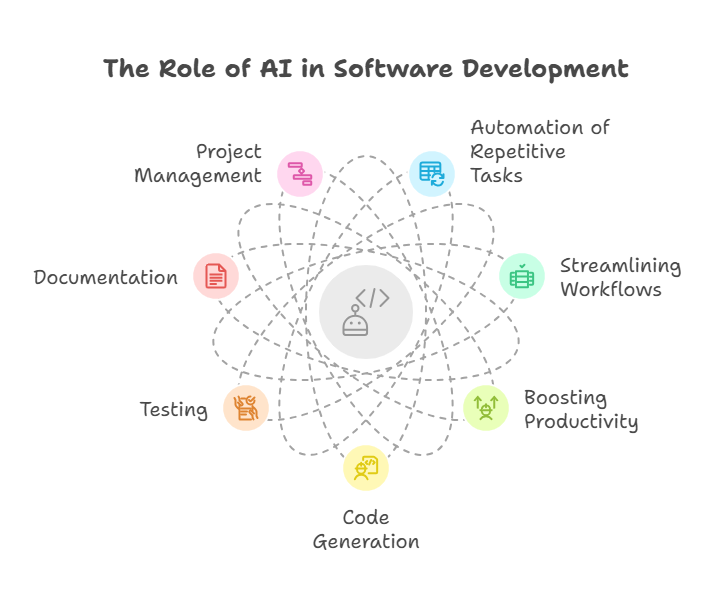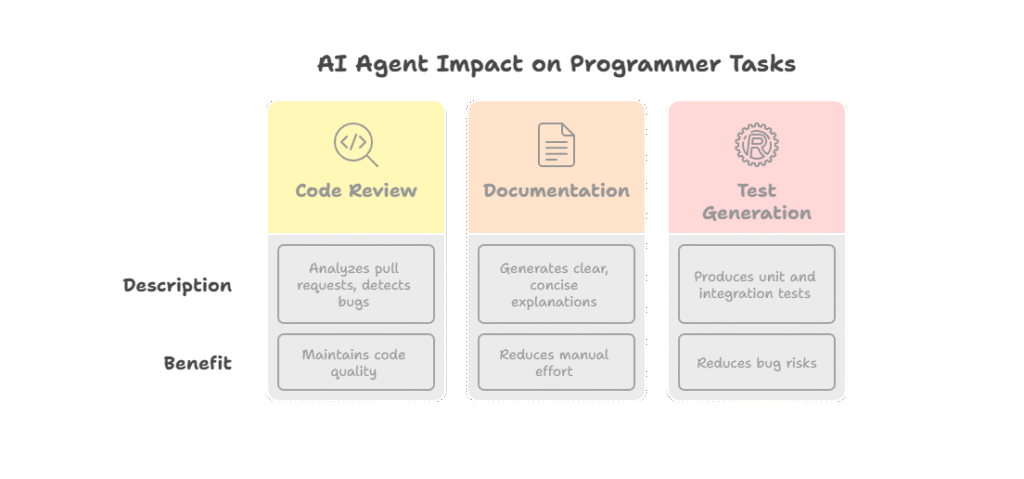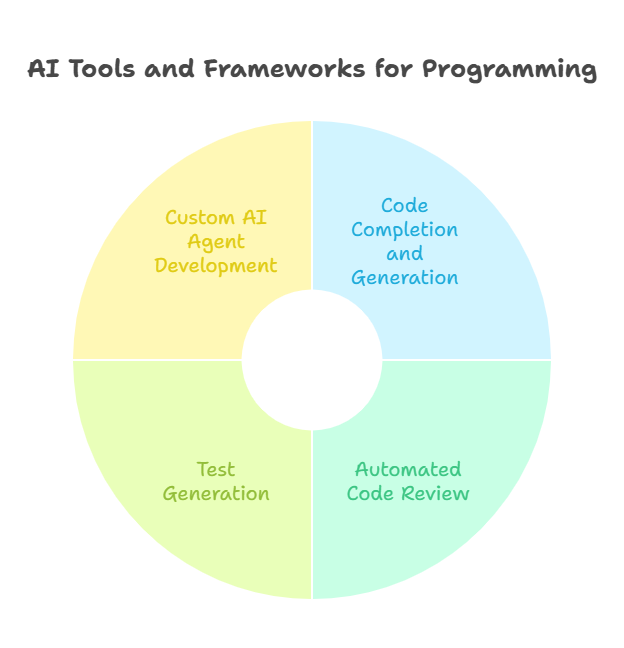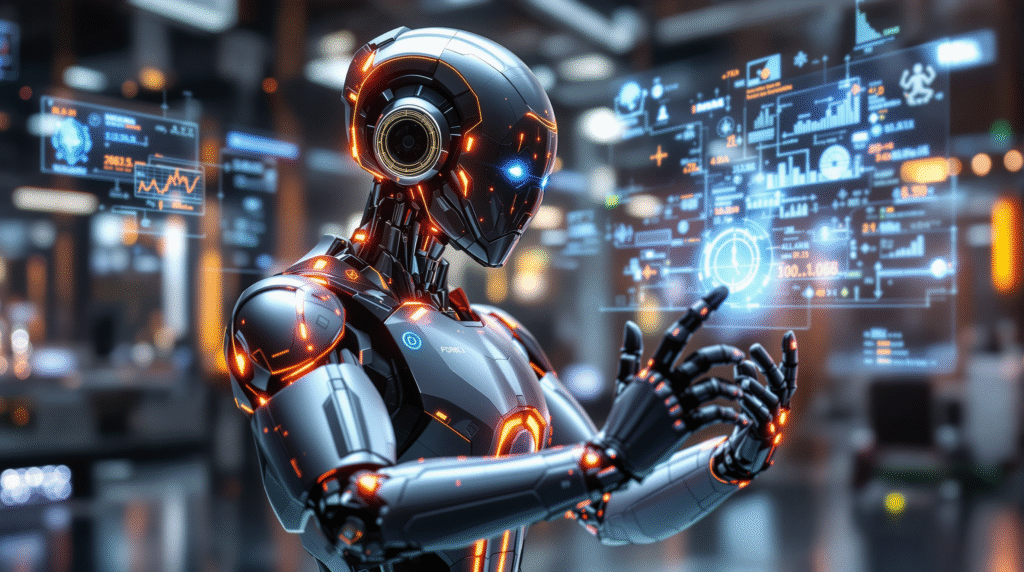Introduction: The Role of AI Agents in Modern Programming
The world of software development is evolving rapidly, and artificial intelligence is at the heart of this transformation. AI agents are becoming indispensable tools for programmers, helping to automate repetitive tasks, streamline workflows, and boost productivity. In today’s fast-paced environment, developers are expected to deliver high-quality code quickly, adapt to new technologies, and maintain complex systems. AI agents address these challenges by acting as intelligent assistants that can handle everything from code generation and testing to documentation and project management.
The integration of AI agents into daily programming routines is not just a trend—it’s a response to the growing complexity of software projects and the need for greater efficiency. By automating routine and time-consuming activities, AI agents free up developers to focus on creative problem-solving and innovation. As a result, teams can deliver better software faster, while individual programmers can enjoy a more engaging and less monotonous work experience.

What Are AI Agents? Key Concepts and Definitions
AI agents are autonomous software entities that use artificial intelligence techniques to perceive their environment, make decisions, and perform tasks on behalf of users. In the context of programming, an AI agent might analyze code, suggest improvements, generate documentation, or even manage parts of the development process. These agents leverage technologies such as machine learning, natural language processing, and knowledge representation to understand both code and human instructions.
A key characteristic of AI agents is their ability to learn and adapt. Unlike traditional automation scripts, which follow predefined rules, AI agents can improve their performance over time by learning from data, feedback, and user interactions. They can operate independently or as part of a multi-agent system, collaborating with other agents or humans to achieve complex goals.
In practical terms, AI agents for programmers often come in the form of plugins for integrated development environments (IDEs), chatbots, or cloud-based services. They can assist with code completion, error detection, test generation, and many other aspects of software development. By understanding both the technical and human sides of programming, AI agents are redefining what it means to be an effective and efficient developer in the modern era.
Common Tasks Programmers Can Automate with AI
AI agents are revolutionizing the daily routines of programmers by automating a wide range of tasks that were once manual and time-consuming. One of the most popular applications is intelligent code completion, where AI predicts and suggests the next lines or blocks of code, significantly speeding up the development process. AI can also automate code review by analyzing pull requests, detecting bugs, and recommending improvements, which helps maintain code quality and consistency across teams.
Another area where AI shines is in generating and maintaining documentation. Instead of writing docstrings or API documentation manually, programmers can rely on AI agents to create clear and concise explanations based on the code itself. Test generation is also becoming more automated, with AI tools capable of producing unit tests and integration tests that cover a wide range of scenarios, reducing the risk of undetected bugs.
Beyond these core tasks, AI agents can assist with refactoring code, identifying performance bottlenecks, and even managing project tasks by integrating with issue trackers and CI/CD pipelines. By automating these everyday activities, AI agents allow developers to focus on solving complex problems and building innovative features, rather than getting bogged down by repetitive work.

Choosing the Right AI Tools and Frameworks
Selecting the appropriate AI tools and frameworks is crucial for effective automation in programming. The choice depends on the specific needs of the project, the programming languages in use, and the desired level of integration. For code completion and generation, tools like GitHub Copilot, Tabnine, and Codeium are widely adopted and offer seamless integration with popular IDEs such as Visual Studio Code, JetBrains, and others.
For automated code review and quality assurance, platforms like DeepCode, SonarQube, and Codacy leverage AI to analyze codebases and provide actionable feedback. When it comes to test generation, tools such as Diffblue Cover and Ponicode can automatically create and maintain tests, saving valuable development time.
If you’re interested in building custom AI agents, Python frameworks like spaCy for natural language processing, scikit-learn and TensorFlow for machine learning, or Mesa for multi-agent simulations provide a solid foundation. Many of these tools offer APIs and SDKs that make it easy to integrate AI capabilities directly into your development workflow.
Ultimately, the best approach is to evaluate the available options based on your team’s expertise, the complexity of your projects, and the specific challenges you want to address. By choosing the right combination of AI tools and frameworks, you can maximize the benefits of automation and create a more efficient, productive, and enjoyable programming environment.

Integrating AI Agents into Your Development Workflow
AI agents deliver the most value when they are woven directly into the tools and rituals you already use: IDEs, version-control hooks, CI/CD pipelines, and chat channels. A practical integration plan usually follows four steps:
Identify repetitive pain points
• Boilerplate coding, test writing, PR reviews, release notes, etc.
Select the right agent & touchpoint
• IDE plug-in for code completion; Git hook for code review; ChatOps bot for ops queries.
Establish security & governance
• Scope the files the agent may read, scrub secrets from prompts, log every exchange.
Measure, refine, and retrain
• Track adoption, code-quality metrics, turnaround time; fine-tune prompts or model choice.
Example – Git Pre-Commit Hook that Runs an AI Code Review
The script below intercepts the staged diff, sends it to an LLM, and prints feedback before the commit proceeds. Drop the file into .git/hooks/pre-commit, mark it executable, and export OPENAI_API_KEY.
python
#!/usr/bin/env python3
"""
AI-powered pre-commit reviewer.
Blocks commit if the model flags critical issues.
"""
import os, subprocess, sys, textwrap, openai
openai.api_key = os.getenv("OPENAI_API_KEY")
MODEL = "gpt-4o-mini"
def staged_diff() -> str:
cmd = ["git", "diff", "--cached", "--unified=0"]
return subprocess.check_output(cmd, text=True)
def review(diff: str) -> str:
prompt = textwrap.dedent(f"""
You are a senior software architect. Review this git diff.
List critical bugs or security problems first. Be concise.
```diff
{diff}
```""")
chat = openai.ChatCompletion.create(
model=MODEL,
messages=[{"role": "user", "content": prompt}],
temperature=0.1,
)
return chat.choices[0].message.content.strip()
def main():
diff = staged_diff()
if not diff:
sys.exit(0) # nothing to review
feedback = review(diff)
print("\nAI Review:\n" + "-"*40 + f"\n{feedback}\n" + "-"*40)
if "CRITICAL" in feedback.upper():
print("Commit blocked ‑ fix issues above.")
sys.exit(1)
if __name__ == "__main__":
main()Result: developers get instant, context-aware feedback without leaving the terminal, and severe issues can gate the commit.
Real-World Examples of Automation
Continuous Documentation
Companies like Shopify use AI agents that scan merged PRs nightly and update internal docs & changelogs automatically.
Test-Suite Expansion
Fin-tech startups tap agents to generate parametrized unit tests, doubling coverage with minimal human effort.
Legacy Refactoring
Enterprises migrating from Python 2 to 3 deploy AI to rewrite syntax, insert type hints, and ensure parity via generated tests.
ChatOps Troubleshooting
On-call engineers query logs in natural language; the agent returns metrics, proposes fixes, or rolls back deployments.
Example – Auto-Generating Docstrings for a Codebase
The snippet walks a project directory, finds functions lacking docstrings, and asks an LLM to create them. Perfect for nightly CI jobs.
python
import ast, os, openai, textwrap, pathlib
openai.api_key = os.getenv("OPENAI_API_KEY")
MODEL = "gpt-4o-mini"
def generate_docstring(src: str, fn_name: str) -> str:
prompt = textwrap.dedent(f"""
Write a precise Python docstring (Google style) for the function `{fn_name}` below:
```python
{src}
```""")
res = openai.ChatCompletion.create(
model=MODEL,
messages=[{"role": "user", "content": prompt}],
temperature=0.0,
)
return res.choices[0].message.content.strip()
def process_file(path: pathlib.Path):
tree = ast.parse(path.read_text())
modified = False
for node in ast.walk(tree):
if isinstance(node, ast.FunctionDef) and ast.get_docstring(node) is None:
src = ast.get_source_segment(path.read_text(), node)
doc = generate_docstring(src, node.name)
node.body.insert(0, ast.Expr(value=ast.Constant(doc)))
modified = True
if modified:
path.write_text(ast.unparse(tree))
def scan_project(root="my_package"):
for p in pathlib.Path(root).rglob("*.py"):
process_file(p)
if __name__ == "__main__":
scan_project()Integrate this script into a nightly CI step; every morning, the repo features fresh, standardized docstrings—no manual toil required.
Benefits and Potential Pitfalls
The integration of AI agents into a programmer’s daily workflow brings a host of tangible benefits. First and foremost, automation of repetitive tasks—such as code review, documentation, and test generation—frees developers to focus on creative problem-solving and innovation. This leads to higher productivity, faster delivery cycles, and improved job satisfaction. AI agents also help maintain consistent code quality by providing real-time feedback and enforcing best practices, which is especially valuable in larger teams or open-source projects.
Another significant advantage is the acceleration of onboarding for new team members. With AI agents capable of answering questions, generating examples, and highlighting project conventions, newcomers can become productive much more quickly. Additionally, AI-driven automation can reduce human error, catch subtle bugs, and even suggest optimizations that might be overlooked during manual review.
However, there are potential pitfalls to consider. Over-reliance on AI-generated suggestions can lead to complacency, where developers accept recommendations without critical evaluation. This may result in the introduction of subtle bugs, security vulnerabilities, or non-idiomatic code. There is also the risk of AI agents reinforcing outdated patterns or propagating mistakes found in their training data. Privacy and security are important concerns as well, since AI agents often require access to source code and sensitive information.
To maximize the benefits and minimize the risks, it’s essential to treat AI agents as collaborative tools rather than infallible authorities. Regular review, validation, and a healthy dose of skepticism are key to ensuring that automation enhances rather than undermines software quality.
Best Practices for Effective Automation
To harness the full potential of AI agents in programming, teams should adopt a set of best practices that balance efficiency with safety and quality. First, always review and test AI-generated code before merging it into the main codebase. Automated suggestions should be seen as drafts or starting points, not final solutions. Incorporate automated testing and continuous integration to catch issues early and maintain high standards.
Establish clear guidelines for when and how to use AI agents. For example, use them for boilerplate code, documentation, or initial drafts, but require manual review for complex logic or security-critical components. Encourage transparency by documenting when AI-generated code is used and why, making it easier to track changes and understand decision-making processes.
Regularly update and retrain AI agents to ensure they stay current with evolving best practices and project requirements. Solicit feedback from developers to identify areas where automation is most helpful and where it may need refinement. Finally, foster a culture of learning and adaptation, where developers are encouraged to experiment with new tools, share insights, and continuously improve their workflows.
By following these best practices, teams can create a development environment where AI agents amplify human creativity, reduce drudgery, and help deliver better software—while maintaining control, quality, and security at every step.
The Future of AI Agents in Software Development
The future of AI agents in software development is both dynamic and full of promise. As artificial intelligence models become more advanced, AI agents will evolve from simple assistants into proactive collaborators capable of understanding project context, coding standards, and even business goals. We can expect agents to handle increasingly complex tasks, such as automated architecture design, intelligent refactoring, and real-time performance optimization.
One emerging trend is the use of multi-agent systems, where specialized AI agents work together—some focusing on code generation, others on security, testing, or documentation. This collaborative approach will enable more comprehensive automation and higher code quality. Additionally, as AI agents become more explainable and transparent, developers will gain greater trust in their recommendations, making it easier to adopt these tools in critical and regulated environments.
Integration with cloud platforms, DevOps pipelines, and project management tools will become even more seamless, allowing AI agents to participate in every stage of the software lifecycle. In the future, developers may spend less time on routine coding and more on creative problem-solving, system design, and innovation. The skill set of programmers will also evolve, with a growing emphasis on understanding how to collaborate with AI, interpret its suggestions, and guide its learning.
Despite these exciting possibilities, challenges remain. Ensuring ethical use, maintaining data privacy, and preventing bias in AI-generated code will require ongoing attention. However, with thoughtful adoption and continuous improvement, AI agents are set to become indispensable partners in building the software of tomorrow.
Conclusion
AI agents are transforming the daily work of programmers, offering powerful tools to automate routine tasks, improve code quality, and accelerate development. By integrating AI into their workflows, developers can focus more on innovation and less on repetitive chores, leading to greater productivity and job satisfaction.
The journey toward fully realizing the potential of AI agents is ongoing. It requires a balanced approach—embracing automation while maintaining oversight, fostering a culture of learning, and adapting to new ways of working. As AI technology continues to advance, those who thoughtfully integrate AI agents into their development processes will be best positioned to deliver high-quality software efficiently and creatively.
In summary, AI agents are not just a passing trend but a fundamental shift in how software is created. By leveraging their strengths and remaining mindful of their limitations, programmers and teams can unlock new levels of efficiency, collaboration, and innovation in the ever-evolving world of software development.
From Pull Request to Deployment: AI Agents in the Review Process
AI Agents in Practice: Automating a Programmer’s Daily Tasks


